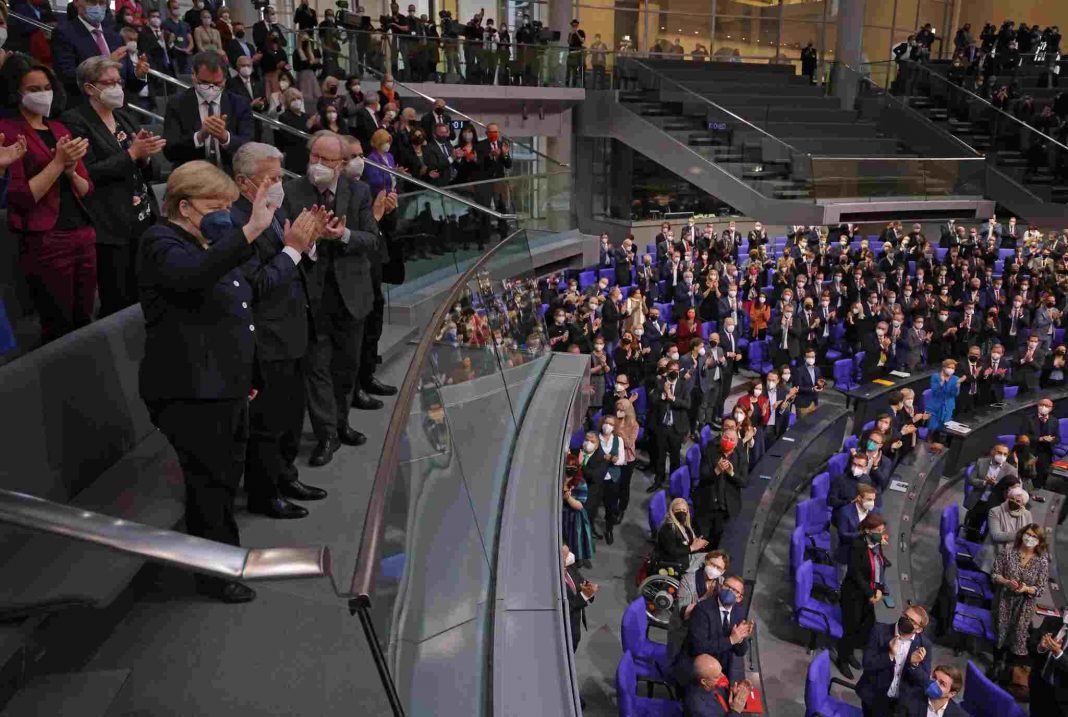It had an antique feel about it. Ms. Angela Merkel, who has presided over European politics for the greater part of two decades, handed over her office to the next German chancellor, thanked her staff, and then walked out the door – her last departure.
Ms. Merkel, who has served as Germany’s leader and unofficial leader of Europe for the last 16 years, stepped down from the position she initially assumed when President George W. Bush was still in the White House in a manner that was emblematic of her personality.
Mrs. Merkel congratulated her successor, Olaf Scholz, at a small meeting at the chancellery. “Congratulations, Mr. Chancellor, dear Olaf Scholz,” Ms. Merkel said. “I can tell you from personal experience that being elected to this position is an emotional event.”
Chancellor Angela Merkel described her job as “an exciting and satisfying task, as well as a demanding obligation,” but she added that “if you accept it with enthusiasm, it is maybe one of the most beautiful jobs there are to be accountable for our nation.”
Ms. Merkel was the world’s most powerful female leader for a long time, serving as Germany’s and Europe’s dominant political figure through four U.S. presidents, five British prime ministers, and eight Italian prime ministers. Her slow climb to power earned both fans and critics, but she remained a lone source of stability for the continent, even as the continent was thrown into crisis after crisis.
Ms. Merkel, a Christian Democrat, has been criticised for failing to nurture a successor; nonetheless, it is possible that she did so in the end. The only difference is that, much to the dismay of her own party, Mr. Scholz, a Social Democrat who served as her final finance minister, was sworn in as her successor on Wednesday, after a campaign that pledged continuity in government.
“It was a significant period of time during which you served as chancellor of our nation, and you accomplished significant things,” Mr. Scholz said as she officially turned over the chancellery and its employees to him.
“It was more than simply these events that brought us together,” Mr. Scholz said. “There was always a sense of trust between us when we worked together.” I feel this is positive because it demonstrates that we are a strong, competent democracy in which there is a great deal of agreement among democratic leaders and a spirit of collaboration.”
Her feeling of determination, as well as her readiness to compromise, according to several who worked closely with the outgoing German chancellor, served as the foundation of her influence.
In the years to come, the entire impact that Ms. Merkel, a pastor’s daughter from the erstwhile communist East, has had on her nation and continent will be fully revealed. However, for the time being, her decision to let more than a million refugee seekers into Germany in 2015 and 2016 is largely seen as the fulcrum of her legacy.
Because of her choice, Germany was profoundly split, notably along the ancient East-West fault line, and a far-right nationalist movement rose to prominence, becoming stronger than at any point since the Nazis.
However, it also helped to soften Germany’s international image and promote her country as a liberal beacon at a time when populism endangered the fundamental foundations of the West’s democratic system in the first place.
Europe’s financial crisis, as well as her stingy prescription for many years of severe budget cutbacks as a way out, were two additional periods that distinguished her tenure in power. Many southern Europeans have yet to forgive her for this, more than a decade after she took office.
At the time, her popularity ratings were rapidly declining, and it seemed as if she may not be able to complete her fourth term in office politically. It was the epidemic that provided Ms. Merkel, an educated scientist with a well-known calm demeanour, with yet another honeymoon period in the polling booths.
Mr. Scholz, who served as her finance minister for the previous four years, has a temperament that is very similar to hers, and he has taken advantage of the similarities. “There won’t be that much of a difference,” he told the chancellery workers on Wednesday morning.
Members of Parliament had earlier on Wednesday decided to install Mr. Scholz into his position from the visitor’s gallery in Parliament, where she and her family had sat four times to see her swearing in. Her colleagues in the chamber gave her a standing ovation before silently sneaking out a back door.
Ms. Merkel represented a series of firsts from the time she took the oath of office in 2005: she was the first chancellor born after World War II, the first to come from the former Soviet Union, and the first woman to hold the position. Now she has made history by being the first contemporary chancellor to resign from her position, not because she lost an election or a legislative vote, but because she felt she had served her country for a sufficient amount of time.
In 1991, shortly after she was appointed Minister for Families and Children under Chancellor Helmut Kohl, photographer Herlinde Koelbl began photographing Ms. Merkel’s political career. Herlinde Koelbl is considered to be one of the most intimately documented individuals in Ms. Merkel’s political career.
The toll of 16 years working with Europe’s greatest economy is obvious, however, when comparing Ms. Koelbl’s most recent photographs with those taken when she was younger…. The open and interested glance has been replaced with a more distant and dubious one.

